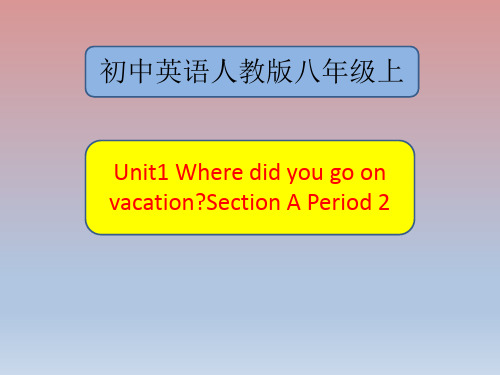八年级英语上册第一单元SectionA
- 格式:doc
- 大小:115.81 KB
- 文档页数:8






八年级上册英语第一单元课文一、课文原文(人教版八年级上册英语第一单元Where did you go on vacation?)Section A 1b.Conversation 1.Boy: Where did you go on vacation, Grace?Grace: I went to New York City.Boy: Oh, really? Did you go with anyone?Grace: Yes, I went with my mother.Conversation 2.Boy: Where did you go on vacation, Kevin?Kevin: I went to the mountains.Boy: Was the weather good?Kevin: Yes, it was. It was sunny and warm all day.Conversation 3.Boy: Where did you go on vacation, Julie?Julie: I went to the beach.Boy: Did you play volleyball?Julie: No, I didn't.2a & 2b.Rick: Hi, Helen. Long time no see.Helen: Hi, Rick. Yes, I was on vacation last month.Rick: Oh? Where did you go?Helen: I went to Guizhou with my family.Rick: Wow! Did you see Huangguoshu Waterfall?Helen: Yes, I did. It was wonderful! We took quite a few photos there. What about you? Did you do anything special last month?Rick: Not really. I just stayed at home most of the time to read and relax.Section B 2b.Jane: Hi, Bob. What did you do last weekend?Bob: I visited my uncle in the countryside.Jane: Sounds good. How was your trip?Bob: It was great. I had so much fun. I went fishing with my uncle, and we rode horses on the farm. I also milked a cow. It was really interesting.Jane: Wow! It seems that you had a wonderful time.Bob: Yeah. How about you? What did you do last weekend?Jane: I just stayed at home and did my homework.二、重点词汇与短语。
人教新目标英语八年级上册Unit 1 sectionA语法知识点总结Unit 1 Where did you go on vacation?一般过去时态的概念:1.表示过去某时间发生的动作或存在的状态。
2.表示过去经常性习惯性的动作。
一般过去时常用的标志词有:yesterday,the day before yesterday,last week/month/year, just now, …ago,in+过去时间…一.用Be动词的一般过去时(1)肯定句式:主语+ was / were + 其它.(2)否定句式:主语+ wasn’t /weren’t+ 其它.(3)一般疑问句:Was/Were + 主语+ 其它?肯定回答:Yes,主语+ was / were .否定回答:No,主语+ wasn’t /weren’t.(4)特殊疑问词+was/were+主语+其他?肯定句:The air was clean yesterday.否定句:The air wasn't clean yesterday.一般疑问句:Was the air clean yesterday?肯定回答:Yes, it was.否定回答:No, it wasn't.特殊疑问句:How was the air yesterday?二.行为动词(v.)的一般过去时态(1)肯定句式:主语+ v-ed+ 其它.【do , does---did】(2)否定句式:主语+ didn’t + v原形+ 其它. 【did not = didn’t】(3)一般疑问句:Did + 主语+ v原形+ 其它?肯定回答:Yes,主语+did.否定回答:No,主语+did’t.(4)特殊疑问词+did+主语+v.原形+其他?肯定句:I rode a horse last Sunday.否定句:I didn‘t ride a horse last Sunday.一般疑问句:Did you ride a horse last Sunday? 肯定回答:Yes, I did.否定回答:No, I didn't.特殊疑问句:(1)What did you do last Sunday?(2)When did you ride a horse?三、动词过去式的构成1. 规则动词的过去式1) 一般情况下,在动词原形后面加-ed。
八年级上Unit1 Section A一、重点单词[in'dʒɔiəbl] adj. ___________________ 有乐趣的;令人愉快的[æk'tɪvəti] n.____________活动;活跃[dɪ'saɪd] v.____________决定;选定[traɪ] v.____________尝试;设法;努力['pærəɡlaɪdɪŋ] n.____________空中滑翔跳伞[bɜːd] n.____________鸟;禽['baɪsɪkl] n.____________自行车['bɪldɪŋ] n.____________建筑物['treɪdə(r)] n.____________商人;商船['wʌndə(r)] v.____________惊奇;想知道;怀疑['dɪfrəns] n.____________差异;不同[tɒp] n.____________顶部;顶[weɪt] v.____________等;等待[ʌm'brelə] n.____________伞;雨伞[wet] adj.____________湿的;雨天的[bɪ'ləʊ] prep.____________低于;在 ... 下面 adv.在下面;[ɪ'nʌf] adj.____________足够的 adv.足够地;充分地['hʌŋgri] adj.____________饥饿的;渴望的[əz] conj. ____________如同,像 ... 一样[hil]n.______________ 小山;山丘[dʌk] n.____________鸭肉;鸭[dɪs'laɪk] v.____________不喜欢;厌恶 n.不喜爱;厌恶;反感二、重点短语1.feel like给……的感觉;感受到2.on vacation 度假3.go to the beach 去沙滩4.go shopping 去买东西5. in the past 在过去6. walk around 四处走走7.too many太多(后接可数名词复数) too much太多(后接不可数名词) much too太(后接形容词)8.because of 因为 9.one bowl of ……一碗……10.the next day第二天 11. find out 找出,查明12. go on继续 13. take photos照相14. something important 重要的事 15.up and down 上上下下16.in excitement 兴奋地 e up 出来三、常考用法1.arrive in+方 arrive at +小地方到达某地2.decide to do sth决定去做某事3.try doing sth尝试做某事 try to do sth 尽力去做某事4.feel like doing sth. 想要做某事5.enjoy doing sth 喜欢做某事6.want to do sth 想去做某事7.start doing sth 开始做某事8.stop doing sth停止做某事9.look +形容词看起来……10.dislike doing sth 不喜欢做某事11.why not do sth? = Why don’t you do sth? 为什么不做……呢?12.so+形容词+that+从句如此……以至于……13.tell sb (not)to do sth告诉某人(不要)做某事14.keep doing sth 继续做某事15.forget to do sth忘记去做某事 forget doing sth 忘记做过某事四、重点语法——一般过去时1.一般过去时的基本用法表示过去发生的动作或存在的状态We went to the beach and swam in the sea yesterday.表示过去的习惯动作或过去经常发生、反复发生的动作或存在的状态。
My father always walked to the school last year.2.动词过去式变化规则:①直接加ed:watched talked②以不发音的字母e结尾的动词直接加d:liked lived③以辅音字母y结尾的动词,y变成i再加ed:studied如果y前面是元音,则直接加ed:stayed④以重读闭音节结尾的,且词尾只有一个辅音字母(辅元辅),双写再加ed:stopped 写出以下动词的过去式look- play- hope- live- stop- plan- worry- carry- bring- buy- come- do- drink- eat- feed- go- have- hide-【练习】1.The funny story _________ me laugh.A.makeB. madeC. letD. to let2.She ________ very happy when she heard the good news.A. feelB. feelsC. feltD. feeled3. He decided _________ to Hainan for his holidayA. flyB. fliesC. to flyD. flew4. They had great fun _________ in the water.A. playB. playsC. playingD. playful5. The movie was so _________ that we all liked it.A. excitingB. excitedC. boringD. bored6. What did Lisa ________ about her vacation?A. talkB. sayC. tellD. speak7. She _______ in Shanghai this morning with her parents.A. got toB. reachedC. arrivedD. got8. -I usually go there by taxi.- Why not ________ by bus for a change.A.to try goingB. trying to goC. to try and goD. try doing9.I felt like I __________.A.swimB. swimmingC. to swimD. was swimming10.We couldn’t see anything ________ the heavy foggy weather.A.soB. becauseC. because ofD. whyBCCCA BCDDC五、讲解1.What activities do you find enjoyable?activity为可数名词,意为“活动”。
例如:What activities do you want to take after school?【拓展】其形容词形式为active :积极的。
常考短语:be active in 在某方面积极例如:My sister is very active in the campaign protecting Our Earth.【练习】We can have many _________ after class in our school, so most of us are very _______ in taking them.A.activity; activeB. active ; activityC. activities; activeD. active ; activities2.It was sunny and hot, so we decided to go to the beach near out hotel.动词decide意为“决定”,常考短语:decide to do sth.决定做某事 decide not to do sth. 决定不做某事3.My sister and I tried paragliding.try在此为动词,意为:试图;设法;努力尝试【练习】- I didn’t hear you come in just now.-That’s good. We tried _______ any noise, for you were sleeping.A.not makeB. not to makeC. to makeD. making4.I feel like I was a bird.feel like :给……的感觉像;感受到。
其中like为介词,意为“像”。
例句:What’s this in my pocket? It feels like a nut. 什么东西在我口袋里?感觉像是坚果。
【拓展】feel like 还有“想要……”的意思。
常考用法:feel like doing sth. 相当于want /would like to do sth. 表示想要做某事。
如:I don’t feel like drinking beer.= I don’t want to drink beer. 我不想喝啤酒。
5.I wonder what life was like here in the past. 我想知道这里过去的生活是什么样子。
wonder 用作动词,意为:想知道,相当于want to know.I wondered if you like her.我想知道你是否喜欢她。
I wonder why Ann is late. 我想知道安为什么迟到了。
【拓展】wonder的用法①后接that 引导的宾语从句,表示“对……感到惊讶”,that常常可以省去。
I wonder (that) she has won the race. 我对他赢了比赛感到惊讶。
②后接“疑问词+不定式”构成的短语I’m just wondering how to do it. 我正想知道该怎样做那件事。
③后接if或whether引导的宾语从句,常用来表达一种委婉的请求或疑问。
She wondered whether you were free that morning. 她想知道你那天上午是否有空。